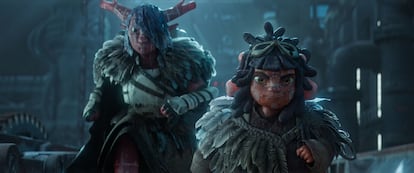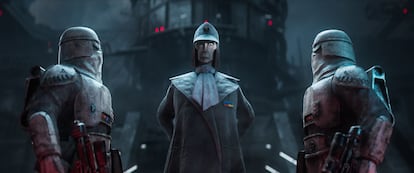‘In the Stars’, a ‘Star Wars’ story inspired by the indigenous peoples of Patagonia
The Chilean studio Punk Robot joins the universe of the Force with an animated short film that is part of the second season of the ‘Visions’ anthology, available on Disney+

Everyone, whether fans or detractors, has a memory related to Star Wars. Perhaps vague, but it is there. Gabriel Osorio is no exception. He was about four years old when his father passed away. A couple of years later, when he was six, he was at his grandmother’s house watching The Empire Strikes Back, the second film in the saga, originally released in 1980. Everyone familiar with the films – or with popular culture – knows about the mythical scene in which Darth Vader, the quintessential villain, tells a dark secret to Luke Skywalker: “I am your father.” This revelation, one of the most famous lines in the history of cinema, was a plot twist that shocked many, and Osorio, again, was no exception.
“I loved the movie. It really made a mark on me because I had fuzzy memories of my dad. Luke didn’t know, he wasn’t so sure who his father was and what his past was. I related to that character. That is largely what has always attracted me about Star Wars, the human relationships between the characters, the broken relationships,” explains Osorio to EL PAÍS.
Later, that child who was moved by one episode of the saga enthusiastically watched the other two parts of the first trilogy, without suspecting that 31 years down the line he was going to become a content creator in that vast universe. The 39-year-old from Santiago, Chile, is one of the directors that contributed an animated short film for the second season of the anthology Star Wars: Visions, the most recent production of the universe started by George Lucas, available on Disney+. In the Stars was produced by the Chilean animation studio Punk Robot (headed by Osorio), a company that became known worldwide in 2016 when it won the Oscar for Best Animated Short Film for A Bear Story, which was inspired by another member of the filmmaker’s family and the dictatorial era of the Andean country.
In the Stars, one of the nine shorts that make up the anthology, features two sisters, Koten and Tichina, the last of their kind, who live in hiding in their devastated land and discuss how to survive the invasion of the Empire. On a mission to get water, the sisters must defend themselves after they are discovered.
The short is imbued with an aura that shows a Latin American inspiration, marked by cañas and charangos — typical South American instruments — in the musical section, in addition to reflecting its indigenous peoples and their predicaments, such as the eradication of their culture and the extractivism that causes problems like the contamination of ecosystems. These themes, together with some characteristic Star Wars elements like the use of the Force, the spaceships and some well-known characters (in addition to the family angle) were the first ingredients that Osorio, along with Antonia Herrera and Francisco Ortega, considered for the script.
“In the story, the Empire comes and colonizes. We begin to see that colonization is something that all of us in the Americas have in common. Throughout Latin America we went through similar processes of colonization at different times in history. We felt that there was a very important issue that we needed to address as Latin Americans. That’s what gives the short film its identity,” states Osorio

In its second season, Star Wars: Visions bets again on different types of animation, from 3D to traditional hand-drawn 2D animation. The stories are not canon; they are part of an alternate line of short stories set in the galaxy far, far away that seek to push the boundaries of the franchise through different voices. In this case, Punk Robot, with more than 10 years of experience in animation, opted for stop-motion animation for In the stars, also produced by Osorio, Herrera, Pato Escala and María Elisa Soto-Aguilar.
“We wanted an aesthetic that felt handcrafted, setting aside the perfect, super-polished CGI 3D thing and trying to tell the story of the objects. It’s part of the influence of the animation that they’re doing in Guadalajara, what Guillermo del Toro is doing. It is also part of what we feel, an aesthetic with which we deeply relate and which generates that Latin American identity,” continues Osorio.
Regarding this, the director also wanted to reassert the statements made by the Mexican director when he accepted the golden statuette for Pinocchio as the Best Animated Film in the last edition of the Oscars. In his speech, Del Toro gave a message in favor of animation: “Animation is cinema, animation it is not a genre, and it is ready to be taken to the next step. Keep animation in the conversation.” A statement with which Punk Robot wholeheartedly agrees.
“It’s important to understand that animation is for people, not just for children. In fact, when Guillermo gave that speech, I was clapping at home. I mean, I was moved by his words because it’s something that I think all animators feel,” he concludes.
Sign up for our weekly newsletter to get more English-language news coverage from EL PAÍS USA Edition
Tu suscripción se está usando en otro dispositivo
¿Quieres añadir otro usuario a tu suscripción?
Si continúas leyendo en este dispositivo, no se podrá leer en el otro.
FlechaTu suscripción se está usando en otro dispositivo y solo puedes acceder a EL PAÍS desde un dispositivo a la vez.
Si quieres compartir tu cuenta, cambia tu suscripción a la modalidad Premium, así podrás añadir otro usuario. Cada uno accederá con su propia cuenta de email, lo que os permitirá personalizar vuestra experiencia en EL PAÍS.
¿Tienes una suscripción de empresa? Accede aquí para contratar más cuentas.
En el caso de no saber quién está usando tu cuenta, te recomendamos cambiar tu contraseña aquí.
Si decides continuar compartiendo tu cuenta, este mensaje se mostrará en tu dispositivo y en el de la otra persona que está usando tu cuenta de forma indefinida, afectando a tu experiencia de lectura. Puedes consultar aquí los términos y condiciones de la suscripción digital.









































